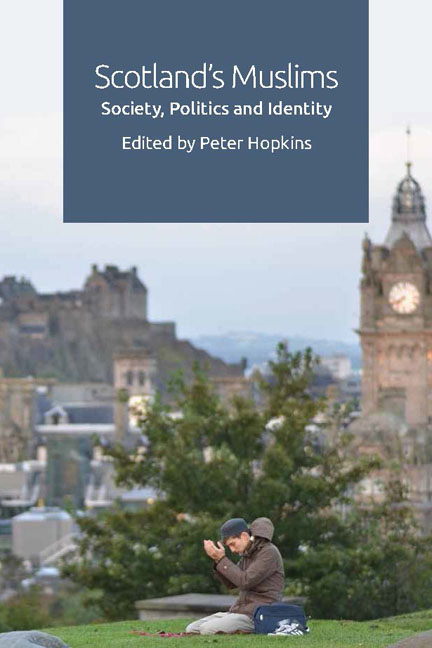Book contents
- Frontmatter
- Contents
- List of Figures and Tables
- Acknowledgements
- Notes on the Contributors
- 1 Introduction Scotland's Muslims: Early Settlement, Current Context and Research Themes
- 2 Health The Health Profile of Muslims in Scotland
- 3 Education Educational Outcomes of Muslim Pupils in Scotland and Parents' Mobilisation of Different Forms of Capital
- 4 Political Participation Young Muslims' Political Interests and Political Participation in Scotland
- 5 Gender and Migration The Role of the ‘Other’ Woman in Shaping the Subjectivities of Recent Muslim Migrant Women to Scotland
- 6 Sexuality Scottish Muslim Gay Men and the Troubling Intersection of Sexuality and Religion
- 7 Young People Muslim Youth in Scotland: Politics, Identity and Multicultural Citizenship
- 8 Generational Relations Gender and Generational Relations for Muslim Women in Scotland
- 9 Heritage Feeling Scottish and Being Muslim: Findings from the Colourful Heritage Project
- 10 Multiculturalism Multiculturalism and Scotland: ‘Bringing the Outside into the Middle’
- 11 Media Muslim Engagement with the Mainstream Media in a Scottish Context
- 12 Representation Representing Islam at the Edinburgh International Book Festival
- 13 Integration Halal Scots: Muslims' Social Integration in Scotland
- Index
12 - Representation Representing Islam at the Edinburgh International Book Festival
Published online by Cambridge University Press: 23 June 2018
- Frontmatter
- Contents
- List of Figures and Tables
- Acknowledgements
- Notes on the Contributors
- 1 Introduction Scotland's Muslims: Early Settlement, Current Context and Research Themes
- 2 Health The Health Profile of Muslims in Scotland
- 3 Education Educational Outcomes of Muslim Pupils in Scotland and Parents' Mobilisation of Different Forms of Capital
- 4 Political Participation Young Muslims' Political Interests and Political Participation in Scotland
- 5 Gender and Migration The Role of the ‘Other’ Woman in Shaping the Subjectivities of Recent Muslim Migrant Women to Scotland
- 6 Sexuality Scottish Muslim Gay Men and the Troubling Intersection of Sexuality and Religion
- 7 Young People Muslim Youth in Scotland: Politics, Identity and Multicultural Citizenship
- 8 Generational Relations Gender and Generational Relations for Muslim Women in Scotland
- 9 Heritage Feeling Scottish and Being Muslim: Findings from the Colourful Heritage Project
- 10 Multiculturalism Multiculturalism and Scotland: ‘Bringing the Outside into the Middle’
- 11 Media Muslim Engagement with the Mainstream Media in a Scottish Context
- 12 Representation Representing Islam at the Edinburgh International Book Festival
- 13 Integration Halal Scots: Muslims' Social Integration in Scotland
- Index
Summary
INTRODUCTION
The year 2013 saw the thirtieth Edinburgh International Book Festival (EIBF), where it was expected that 200,000 people would be in attendance over the course of 17 days for some 700 events involving ‘[m]ore than 800 authors from around the world’ (BBC, 2013). Despite its size, the festival, set in Charlotte Square Gardens, manages to feel like a tented village community. Children laugh and loll about on a low wooden dais, eating ice cream from the stall inside the gardens, their parents sitting beside them. It is usually too wet to sit on the grass, so there is often a polite scramble for the deckchairs, appropriately emblazoned with literary aphorisms, strewn around the square under the shade of umbrellas. The sun is not particularly out in full force during this time of the year, so there is not as much a pull to orient the deckchairs to its rays. But people are enjoying the intermittent sunshine, reading the papers, listening to music through headphones or speaking to others on their mobiles. Some sit on plastic chairs around a table or two, talking, poring over the festival programme. Others kick back on the benches, reading their newly signed books. Yet others are simply people watching. It is quiet, but certainly not silent. The steady hum of conversations in the square mingles occasionally with a child's plaintive cry or the clink of glasses. Clapping and laughter in equal measure erupt intermittently from inside the tents. Playful yet serious, expansive yet intimate, the festival's garden setting is idyllic, a veritable Eden pregnant with the promise of delight and knowledge.
Gardens in Islam are quintessential representations of heaven on earth. Mirroring the gardens of paradise, where the righteous are promised flowing rivers of water, milk, honey and wine (Qur'an, 47: 15), these earthly manifestations of almost Platonic forms of beauty and order provide relief, entertainment and sanctuary. Above all, they are spaces for contemplation. The parallel with the literary festival at Charlotte Square Gardens, ‘the biggest in the world’ according to its director Nick Barley (2011) is, therefore, particularly salient. As a public space for the production of ideas and their dissemination, this home of the EIBF plays a major role in not only influencing but also defining wider debates about art, science, governance, social justice and religion.
- Type
- Chapter
- Information
- Scotland's MuslimsSociety, Politics and Identity, pp. 236 - 258Publisher: Edinburgh University PressPrint publication year: 2017



